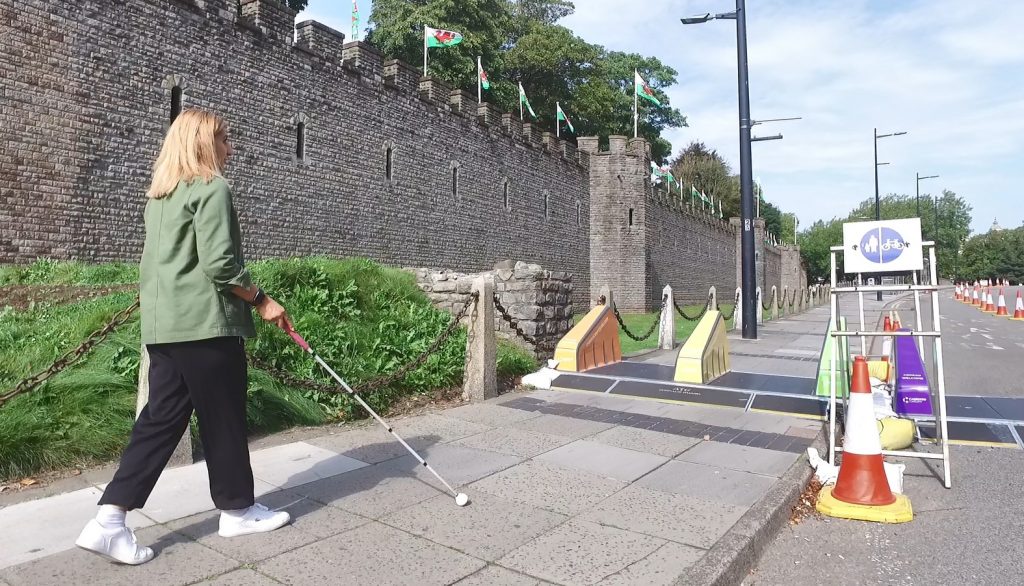Nathan Owen argues that rushing the introduction of micro-mobility at the expense of pedestrians risks jeopardising its long-term success.
As we enter the first week of the national ‘fire-break’, we can all be forgiven for fixating on the current, and seemingly all-encompassing, Covid-19 situation.
But despite being eclipsed as the dominant headline for much of 2020, climate change, the other major global challenge facing this generation has not gone away. The actions we take in response to this challenge will have far reaching consequences for future generations.
In responding to the immediate threat of the virus, the Welsh Government have been clear on their policy direction. They want to use the opportunities afforded by the pandemic to embed a permanent shift in the way we travel.
Ditching the daily commute and reducing our reliance on cars in favour of greener transport like walking, cycling and, potentially, electric vehicles. Improving our air quality and decarbonising our society. An aspiration few would disagree with.
In recent months, electric scooters and other micro-mobility vehicles have been touted by some as a means by which this shift could be achieved. Described by Chris Bibb in his recent article in The Welsh Agenda online as ‘paradigm shifting’ and ‘a win-win-win’ for sustainable travel, he and others are calling on decision makers to get on board and introduce them to our towns and cities at the earliest opportunity.
“Trials of e-scooter rental schemes in Middlesbrough, Coventry and Hartlepool have already been abandoned or scaled back.”
But as experiences from across the border have shown us, the introduction of hundreds of new vehicles into public spaces without the appropriate infrastructure and safety features in place does comes with downsides.
Trials of e-scooter rental schemes in Middlesbrough, Coventry and Hartlepool have already been abandoned or scaled back following widespread misuse, including being ridden through shopping centres and on busy pavements.
If this change is to have the revolutionary, ‘paradigm-shifting’ effect that some envisage then it must be properly thought out and prepared for.
Most of all, it cannot come at the expense of pedestrians, particularly those that already face systemic disadvantage, like people with sight loss and other disabled people.
To paraphrase the Future Generations Commissioner for Wales’ Manifesto for the Future, the Welsh Government must “respond to future trends in ways that reduce inequalities, rather than perpetuating them.”
Wales can lead the way on active, sustainable, low carbon travel. But to do so, it must learn from experiences elsewhere and take steps to mitigate any negative impacts they might have on the public before giving the green light.
Sharing isn’t always caring
The ability to make independent journeys safely and confidently is a vital part of living an active, healthy and fulfilling life that is taken for granted by most.
Being unable to drive, blind and partially sighted people rely on walking journeys to maintain their independence, to travel to work, stay connected with friends and family and to access services like healthcare.
Yet blind and partially sighted people tell us that barriers to journey-making are some of the biggest challenges they face. Streets which are not accessibly designed, coupled with the risk of collision with an e-scooter or a bicycle mean that many feel unable to make walking journeys alone.
“Many e-scooter operators don’t install fixed parking facilities which leads to pavements littered with discarded vehicles.”
From the perspective of blind and partially sighted people, accessible design means tactile markings, pedestrian controlled crossings and dedicated obstruction-free walkways.
Detectable kerbs are also very important because both guide dog and cane users use them to navigate and to maintain physical separation between vehicles – including bikes and e-scooters – and pedestrians.
Accessibly designed infrastructure creates a safer, more user-friendly environment for both cyclists, scooter riders and pedestrians.
But despite significant investment in the seven years since the implementation of the Active Travel Act, Wales still suffers from a lack of accessibly designed infrastructure.
As a result, in many places, bikes and e-scooters are ridden on the same paths as pedestrians and – despite being illegal – the offence is not routinely enforced.
This is a particular issue for blind and partially sighted people, who find extremely difficult to see or hear them, increasing the risk of collision and injury to both groups. But this isn’t just an issue for people with sight loss; older people, people with mobility impairments and young children are also at risk.
Some point to e-scooters as a safe alternative to motorcars. Whilst any collision involving a car is likely to be serious, cars aren’t routinely driven down pavements, walkways and even through busy shopping centres, as has been seen in areas where trials are currently taking place.
This isn’t to demonise or place blame solely at the feet of e-scooter riders and cyclists. In many areas there simply isn’t a clear, safe alternative so pavements become the default option.
Innovative. Informed. Independent.
Your support can help us make Wales better.
Another issue is parking. Many e-scooter operators don’t install fixed parking facilities which leads to pavements littered with discarded vehicles.
So how do we encourage the shift to sustainable travel whilst ensuring the safety, freedom and independence of others?
Getting it right for everyone
Walking is the greenest form of travel and it’s benefits on our health and wellbeing are undeniable. The success of the clean air and decarbonisation agenda relies on getting people walking as well as cycling and scooting for everyday journeys.
If the Welsh Government want to make sustainable travel the easiest, safest and most attractive option then they need to ensure the right infrastructure is in place that facilitates it in all its forms for all its citizens.
We must avoid making a knee-jerk decision to unleash a wave of new vehicles without first creating the conditions for them to be a success. Doing so would undermine not only their long-term success but also that of the wider active travel agenda.
More importantly, it also carries the real risk that we will exacerbate the systemic disadvantage experienced by some groups in our society.
Are we happy to pursue innovation at the expense of others?
All articles published on the welsh agenda are subject to IWA’s disclaimer.





